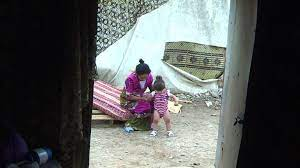Gender Roles: Single Moms

Marriages was brought up during one of our bus rides, and Hamid talked about how if a woman is not a virgin then the wedding will be called off. Additionally, he spoke about how single moms are basically not ideal or okay in Morocco. I decided to research about single moms, and learn and understand more about being a single mom in Morocco because I think that being a single mom is common in the United States, and there is nothing wrong with being a single mom. Furthermore, I go on to find two articles about single mothers and their stories. Morocco World News begins by stating Fedwa Laroui who is a single mom of two children that set herself on fire in 2011 after being excluded from a social housing. However, the article goes on to talk about Amina Chlouchi who is 25 and a single mother. Amina was promised by her boyfriend love and marriage, but when she told him she was pregnant, he left her (Morocco World News, 2012). He does not claim the child even though at the time of t...


